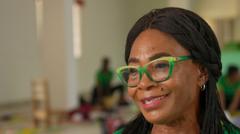In Nigeria, where a staggering number of newborns suffer from neonatal jaundice, the Cerebral Palsy Centre founded by Nonye Nweke aims to provide essential care for affected children. With initiatives like Project Oscar seeking to improve diagnosis and treatment, there is hope for reducing the incidence of cerebral palsy caused by untreated jaundice.
Tackling Neonatal Jaundice: A Nigerian Mother's Mission to Prevent Cerebral Palsy

Tackling Neonatal Jaundice: A Nigerian Mother's Mission to Prevent Cerebral Palsy
One mother's relentless effort highlights the urgent need for better healthcare and awareness regarding neonatal jaundice in Nigeria, aiming to prevent lifelong disabilities.
Babatunde Fashola, affectionately called Baba, is 22 years old, yet his height measures less than 70cm (2ft 4in) due to cerebral palsy, which requires him to have lifelong care. Unable to speak or walk, Baba was abandoned as a baby but found a loving home at the Cerebral Palsy Centre in Lagos, Nigeria, a decade ago. Nonye Nweke, the center's founder, shares that Baba currently weighs 12kg (26lb) and is thriving under their care.
Cerebral palsy, a common neurological disorder in Nigeria, affects many children due to neonatal jaundice, a condition resulting from a buildup of bilirubin in the blood. According to Professor Chinyere Ezeaka, over 60% of newborns in Nigeria suffer from jaundice, yet with timely treatment, most recover quickly. Unfortunately, the lack of immediate medical intervention in Nigeria often leads to severe complications, including brain damage and cerebral palsy. With only three privately run cerebral palsy centers available in a nation of over 200 million, affected children are in dire need of support and care.
Nweke founded the Cerebral Palsy Centre after struggling to find proper resources for her daughter Zimuzo, who is now 17 and also has cerebral palsy. Experiencing stigma and isolation, Nweke's center offers a sanctuary for 12 children receiving free care, funded entirely by donations. The center struggles with a long waiting list of over 100 applications, with monthly care costs reaching $1,000, contrasted against Nigeria’s minimum wage of about $540 per year.
Nweke expressed the challenges she faced as a mother, remarking how overwhelming the situation can become, often leading to moments of depression and heartache. After adopting Zimuzo, she learned about her daughter's condition and decided to embrace the challenges it brought, fueled by love and a commitment to care.
A lack of awareness and adequate healthcare complicates the management of neonatal jaundice in Nigeria. Additionally, local beliefs stigmatizing children with disabilities contribute to the problem, with many being cast out or abandoned due to perceptions of being 'spiritually damaged.'
To combat these issues, the Oscar Project—a charity focused on improving neonatal jaundice diagnosis and treatment—has recently commenced operations in Lagos. Named after a disability advocate affected by untreated jaundice, the project aims to equip healthcare facilities with necessary tools and train health workers to enhance jaundice awareness and treatment protocols.
With the hope of reaching 10,000 mothers and screening 9,000 infants in its first year, coupled with providing much-needed education and resources, the Oscar Project stands to make a significant impact in preventing cerebral palsy. Despite the challenges within Nigeria's overstretched public health system, advocates like Toyin Saraki and Oscar Anderson are committed to making changes, affirming that the work continues until every newborn is safeguarded against jaundice.
With thousands of newborns diagnosed with jaundice annually, the urgency of this mission cannot be overstated. The path ahead may be fraught with hurdles, but there is an evident determination to improve the landscape of healthcare for mothers and children alike in Nigeria.


















